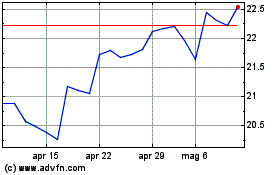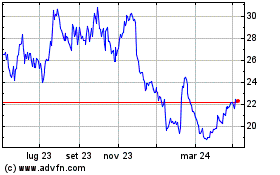Global Gaming Shares Dive After China Proposes Online-Gaming Curbs -- 2nd Update
22 Dicembre 2023 - 1:13PM
Dow Jones News
By Jiahui Huang and Mauro Orru
Global gaming stocks sank after Beijing released draft
regulations for the online game industry that included restrictions
on incentives to play or spend more online.
Shares of Netease, one of China's major online gaming companies,
fell some 25% in Hong Kong. Tencent Holdings, the Chinese tech
juggernaut that is also a domestic gaming giant, ended the day down
more than 12%--wiping out $46 billion in market value and
representing its largest one-day share loss since 2008.
In Europe, shares of Prosus, which holds a large stake in
Tencent, slumped 17%. Shares of Assassin's Creed maker Ubisoft
Entertainment plunged almost 8% in early morning trading in
Paris.
Meanwhile in the U.S., Electronic Arts and Take-Two Interactive
Software shares were down more than 1% premarket, while
Microsoft--which closed its $75 billion acquisition of Activision
Blizzard in October--was down 0.3%.
The rout came after China's National Press and Publication
Administration, the country's media and videogame regulator,
proposed curbs to users' in-game spending as well as banning minors
from tipping players and hosts who livestream games.
The regulations would also prevent companies from offering
probability-based lottery services to minors. Game companies
wouldn't be allowed to set rewards that might encourage more time
or money being spent online, including incentives for daily logins
and maximum amount of recharges according to the draft rules.
The National Press and Publication Administration said it is
seeking public comment on the rules until Jan. 22.
If implemented, the draft regulations would mark another
crackdown on China's lucrative gaming industry. Beijing in 2021
issued strict measures aimed at curbing what authorities described
as youth videogame addiction, banning minors from playing
videogames during the school week.
Sebastian Patulea, vice president at Jefferies's equity research
department, said the unexpected nature of the draft legislation is
a stark reminder to the market that Beijing is very much focused on
lowering in-game engagement.
"This doesn't help with stock sentiment given, by and large,
investors thought this chapter has mostly ended. In our view,
videogame developers that charge on a per-engagement model will
continue to see headwinds," Patulea said.
China is a key market for the gaming industry. The country was
the second largest gaming market globally in 2022 after the U.S. by
sales, according to gaming-market research firm Newzoo.
The proposals could lead to a reduction in player monetization,
hitting revenue and profit margins for gaming companies operating
in one of the industry's biggest markets, Equita SIM analyst
Gianmarco Bonacina wrote in a research note.
--Adria Calatayud contributed to this article.
Write to Jiahui Huang at jiahui.huang@wsj.com and Mauro Orru at
mauro.orru@wsj.com
(END) Dow Jones Newswires
December 22, 2023 06:58 ET (11:58 GMT)
Copyright (c) 2023 Dow Jones & Company, Inc.
Grafico Azioni UBISoft Entertainment (EU:UBI)
Storico
Da Mar 2024 a Apr 2024

Grafico Azioni UBISoft Entertainment (EU:UBI)
Storico
Da Apr 2023 a Apr 2024
